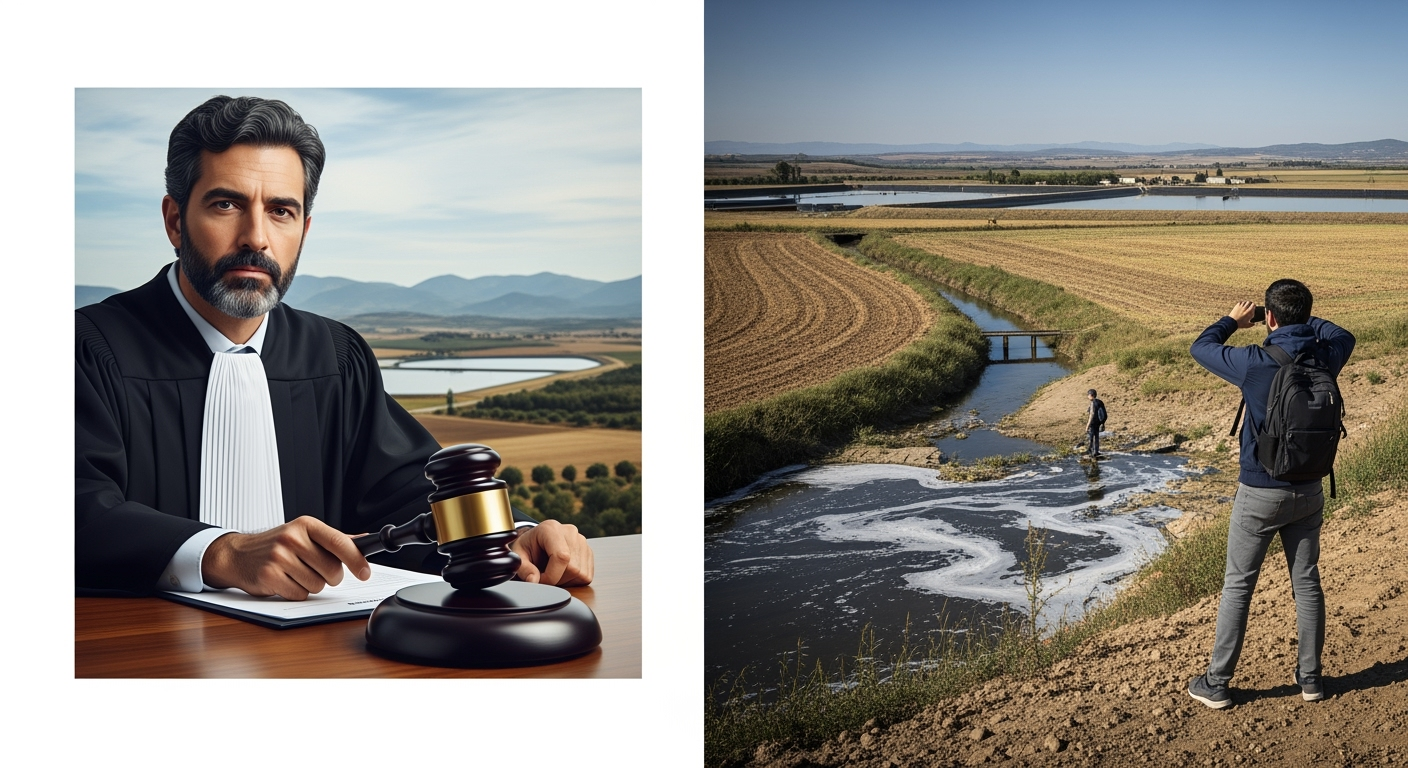Related Articles

The Unseen Costs: Dissecting the Dark Side of Viral Food Trends

Solar's Bold Horizon: Powering Earth and Beyond in a New Energy Era





MADRID, Spain – In a historic legal decision that could redefine environmental protection across Europe, Spain's High Court of Justice of Galicia has ruled that national and regional authorities violated the fundamental human rights of residents by failing to adequately address severe pollution stemming from intensive pig and poultry farming. The judgment, handed down on July 11, 2025, marks the first time a European court has explicitly linked large-scale livestock pollution to human rights breaches, sending a clear message to governments regarding their duty to protect citizens from environmental degradation.
The ruling stems from a lawsuit brought by affected residents of the A Limia region in northwestern Galicia, supported by environmental groups ClientEarth and Friends of the Earth Spain, who argued that decades of mismanagement of industrial livestock waste had rendered life in their community "unfeasible." The court found that the Galician regional government (Xunta de Galicia) and the Miño-Sil Hydrographic Confederation failed in their legal obligations despite being aware of the pervasive issues, leading to widespread water contamination and unbearable odors. This landmark decision is anticipated to empower other communities facing similar challenges and pressure authorities across the continent to tighten environmental regulations and enforcement within the burgeoning intensive farming sector.
For the approximately 20,000 residents of the A Limia area, the court's judgment brings a measure of validation after years of living amidst environmental decay. The proliferation of hundreds of intensive pig and poultry farms in the region had led to a crisis of profound magnitude, transforming daily life into an ordeal of foul odors and contaminated water. Scientific evidence presented in the case revealed "an extremely high level of nitrates" in local water sources, a known risk factor for various cancers and methemoglobinemia, along with the presence of antibiotic-resistant superbugs, identified by the World Health Organization as a top global health threat. Residents of As Conchas, a village particularly affected, reported being afraid to drink water from their wells and being unable to open their windows due to the pervasive stench.
The lawsuit, initially filed in March 2025 by a group of seven individuals, the Neighborhood Association of As Conchas, and the Federation of Consumers and Users (CECU), targeted the Xunta de Galicia, the Miño-Sil Hydrographic Confederation, and five local municipalities. The claimants argued that the uncontrolled expansion of intensive livestock facilities had made their lives "unviable," with local authorities often issuing "rubber-stamp approvals" for new farms without sufficient environmental oversight. The High Court of Justice of Galicia ultimately sided with the residents, ordering both the regional government and the water management body to "immediately adopt all necessary measures to eliminate odours and environmental degradation" around the As Conchas water reservoir and ensure the supply of clean and safe drinking water. The court also mandated compensation payments to six individual claimants.
The crisis in A Limia is emblematic of a broader environmental challenge facing Spain due to the rapid growth of its intensive livestock sector. Spain, Europe's largest pork producer, houses about a third of its pig farms in Galicia alone. Intensive farming, particularly of pigs, generates enormous quantities of waste. One report indicated that these farms can produce up to 15,480 feet of manure annually, which is enough to fill 4.6 Olympic swimming pools. This waste, often stored in inadequately sealed slurry pits, leads to the seepage of toxic particles, including high levels of nitrates, into groundwater and surface water.
The environmental consequences are dire. In Spain, 22% of surface water and 23% of groundwater are contaminated by nitrates, with concentrations exceeding the World Health Organization's maximum allowed level of 50 mg/liter in many areas. This nitrate pollution causes eutrophication, an over-enrichment of water bodies that leads to excessive algal growth, depleting oxygen and creating "dead zones" where aquatic life cannot survive. Beyond nitrates, industrial livestock farming also contributes significantly to air pollution through emissions of methane, a potent greenhouse gas, and ammonia, which accounts for about 50% of PM2.5 air pollution in the EU. The industry's impact also extends to deforestation, as vast tracts of land are converted to grow crops for animal feed.
Spain's pig farming sector has seen explosive growth, with the number of pigs increasing by 21.5% between 2015 and 2020, reaching 32.8 million. This rapid expansion has often outpaced regulatory oversight, leading to recurring environmental disasters. The European Commission has taken Spain to the European Court of Justice for its failure to adequately implement the 1991 Nitrates Directive, which requires member states to monitor water quality and designate Nitrate Vulnerable Zones. Brussels has stated that Spain's efforts have been "insufficient and unsatisfactory," potentially leading to significant fines.
The ongoing struggle in Murcia, centered on the Mar Menor lagoon, provides another stark example. This vast saltwater lagoon, critical for its ecological diversity and tourism, has suffered severe degradation due to nitrate-laden runoff from both agricultural irrigation and intensive pig farming. In August 2021, a mass fish die-off of more than five tonnes highlighted the ecological collapse, attributed to anoxia caused by algal blooms. Legal actions, including the "Caso Topillo," have targeted agricultural companies and officials for their role in polluting the Mar Menor, prosecuting individuals and businesses for illegal water extraction and effluent dumping. The Mar Menor itself was granted legal personality in 2022, a first for Europe, empowering it with rights to protection and restoration.
While the Spanish pork sector, through INTERPORC, asserts a commitment to achieving climate neutrality by 2050 and claims significant reductions in greenhouse gas emissions and water consumption over the last decade, these claims often contrast sharply with the on-the-ground realities documented in A Limia and Mar Menor. Furthermore, recent EU legislation, the Industrial Emissions Directive, adopted in March 2024, has been criticized for being "watered-down" and excluding cattle farming, covering only about 30% of Europe's largest pig and poultry farms.
The Galicia court's ruling is a monumental step, emphasizing that environmental protection is intrinsically linked to human rights. It draws on both the Spanish Constitution and European human rights law, establishing that public authorities have a clear legal duty to act when environmental degradation threatens people's lives and health. This "legal first" in Europe could serve as a powerful precedent for other communities in "Sacrifice Zones" across the continent, allowing them to bring similar lawsuits and demand accountability from their governments.
The decision underscores a growing awareness that the unchecked expansion of industrial agriculture carries severe human costs. As communities increasingly grapple with contaminated water, polluted air, and diminished quality of life, the Spanish legal system has provided a potent tool for environmental justice. The challenge now lies in ensuring that authorities not only comply with this ruling but also proactively implement robust measures to prevent future environmental crises, striking a vital balance between agricultural production and the fundamental right to a healthy environment.